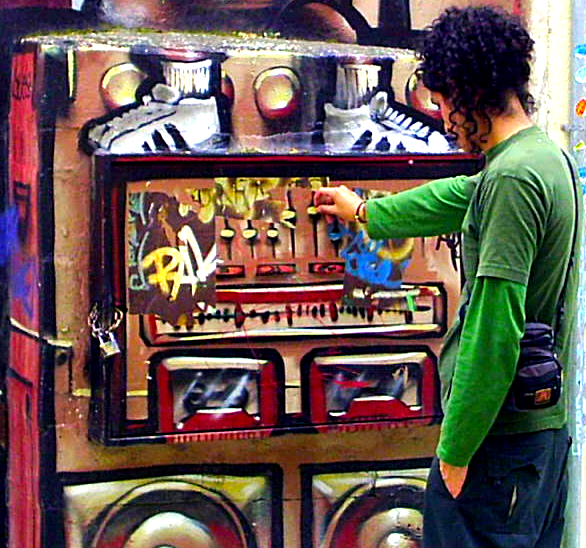Original Title in german: Die Swanen – ein georgischer Bergvolksstamm im Kaukasus
Moderation: Manuel A. Galvan
Svanetian Guest: Mariam Khatchvani ( https://en.wikipedia.org/wiki/Mariam_Khatchvani)
Collaboration Guests: Ursula Ulberth, Nato Mdinaratze
Description:
In this radio-show we talk about the Svanetians (also named as swans), an ancient georgian community in the Caucasus. The program begins with a short historical introduction and ends with an interview with Mariam Khatchvani, a native svanetian woman that currently lives in Tbilisi. She is a film director woman and she deals with the life style and traditions of the svanetians in her films. The show is accompanied by traditional svanetian music. At the end of the show you can also hear traditional georgian music.
Beginning the radio show an historical descriptions about the Svanetians is readed in German language. Here below translated in English:
Svaneti is located in northern Georgia, in the mountains of the Greater Caucasus. A region where time seems to have stood still. In the middle of a grandiose but also merciless nature, the Svanetian people live almost like in the Middle Ages. For centuries, they have settled in a high valley, surrounded by the 5000 meter snowy high peaks of the Caucasus. Isolated by the remoteness of the mountains, the Svanetians have been able to preserve their own culture and language to this day. Even today, the svanetian people transport heavy loads on the traditional ox sledge over the impassable terrain. With simple devices they wrestle the bare necessities of life from their barren floors. Historically, they are mentioned by both the Greeks and the Romans. As early as the third century BC, metallurgy was practiced in Svaneti, raw stone and processed products were supplied to the capital of the old Colchis (Ancient city in Georgia). Gold, which was considered typical of the Colchian culture, was panned in the rivers. In the 4th century BC the Greek chronicler Xenophon describes the Svanetians. Presumably they moved from the plains to the remote mountain regions in the 3rd century BC. The Swanen or Svanetian were described as a warlike people by the Greek geographer Strabo. In the 12th century, the Georgian Kingdom increasingly split up into many regional domains with individual feudal lords. The free Svaneti took a special position, which enjoyed a particularly high degree of autonomy. The entire Svaneti Enguri Valley from Mestia can best be described at this time as an association of independent village communities, each with its own administration, its own jurisdiction and the ability to implement community-related political acts. Svaneti was associated with the Georgian empires throughout the Middle Ages, despite its remote location. In Upper Svaneti alone, over 100 Georgian Orthodox churches were built in the Middle Ages. In the middle of the 19th century, Lower Vanetia was annexed by the Russian Empire. During the Caucasus Wars (Russian occupations) and also during the Democratic Republic of Georgia, there were strong efforts to dissolve traditional legal concepts that were widespread especially in Svaneti and were effective in everyday life ( for example the form of community assemblies, councils of elders and mediation courts ). Because they stand in the way of the modernization of society and the implementation of central government law. The implementation of the Soviet legal system met with great resistance from the Swans and the system could therefore not be introduced. At the same time, traditional legal bodies such as councils of elders and mediator courts were always retained. In disputes, a council of elders mediates. Capital crimes such as murder or manslaughter still mean feuds and blood revenges today. Svaneti stands for a life with aspects like in pre-modern times. The early Christianization of the Swans led to the development of genuine practices. In addition to a pronounced icon cult, the people here maintain a special relationship with their deceased relatives. They firmly believe that the souls of the dead return at regular intervals and that the ancestors continue to take care of the salvation of the living. That is one reason why the svanetians almost never leave their country. In their religious beliefs, death is only separated from life by a “thin wall”. They believe that their loved ones who have died care for the salvation of those who are still alive. That is why the living persons also care for the salvation of the dead. This wall metaphor can be seen particularly well in the Svanetian Worship services, which are usually held outside the church and not in it. The space within the church is reserved for the souls of the deceased. The Swans believe that when a person dies outside his home, his soul wanders freely and must be captured and brought back. One of the funeral rituals in this case is that at the place of his death until morning.The highlight of the memory of the deceased and the honoring of their souls is the annual Lipanali festival.
Music Credits :
…Will be updated soon
Mentioned Links :
…Will be updated soon



















